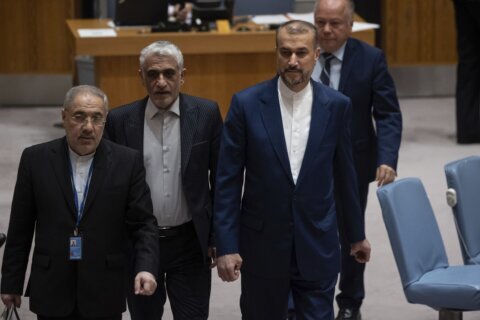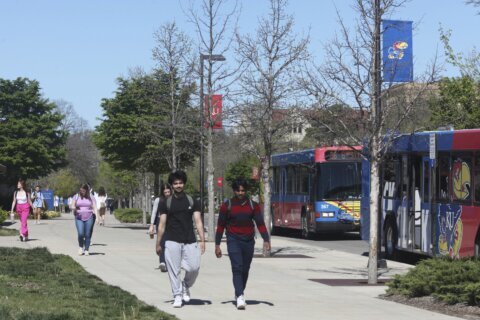ST. PAUL, Minn. (AP) — Protesters descended upon the Minnesota State Capitol on Wednesday to rally against Enbridge Energy’s Line 3 oil pipeline as the project nears completion.
The rally, part of a series of events called Treaties over Tar Sands organized by Indigenous and environmental activists, called on Gov. Tim Walz and President Joe Biden to pull permits and shut down the Line 3 replacement pipeline project. Construction began in December and oil is expected to start flowing before the end of the year.
More than a dozen tipis stood on the state Capitol mall as rallygoers carrying flags and signs that read “Defend the Sacred” and “Honor our Treaties” gathered before the building. Opponents of the pipeline, which would carry Canadian tar sands oil and lighter crude, argue the project violates Native American treaty rights and will aggravate climate change and risk spills that would contaminate areas where Indigenous people hunt, fish and gather wild rice.
“We’re here in ceremony. We’re here to assert our treaty rights and our right to exist and our right to clean water,” Nancy Beaulieu, a founder of the Resilient Indigenous Sisters Engaging Coalition, told rallygoers. “Line 3 violates our treaty and all the treaties along the Mississippi because the water flows. This is a people’s problem, this is not just a Native issue here.”
Organizers estimated the crowd at more than 2,000 while Capitol Security put it at about 1,000.
State troopers watched from the steps of the Capitol building behind fencing reinstalled by state officials last week in anticipation of the event — a move that was criticized by protesters ahead of the event. Hundreds of “water protectors” have been arrested or ticketed in protests across northern Minnesota since major construction began in December.
“They have arrested 800, almost 900 people all for a Canadian corporation to make a buck in the middle of climate chaos,” Winona LaDuke, executive director of the Indigenous based environmental group Honor the Earth, said in an interview. “It’s poor policy and it’s worse practice and we’re here to ask the governor why he continues with such egregious policies and how we’re going to change that.”
Line 3 opponents are running out of options for stopping the project in court. The Minnesota Supreme Court on Tuesday declined to hear a challenge to last year’s decision by the Public Utilities Commission to grant a certificate of need and route permit and approve the environmental review for the project — a decision that gave Calgary, Alberta-based Enbridge a green light to start construction.
Though the Minnesota segment of the pipeline is nearly 90% completed, LaDuke said the fight isn’t over. In addition to the pending legal challenges, they will continue to demand a federal review of how the project would impact the area’s environment before oil starts to flow through the pipeline.
“Maybe we should check the pipe and check the permits and check the environment before they let them put oil in the pipe,” she said.
Line 3 starts in Alberta and clips a corner of North Dakota before crossing northern Minnesota en route to Enbridge’s terminal in Superior, Wisconsin. The 337-mile (542.35-kilometer) segment in Minnesota is the last phase in replacing the deteriorating pipeline that was built in the 1960s. Enbridge says the new pipeline will better protect the environment while ensuring reliable oil deliveries to Midwestern refineries, and that it has worked to respect Native American concerns.
___
Mohamed Ibrahim is a corps member for the Associated Press/Report for America Statehouse News Initiative. Report for America is a nonprofit national service program that places journalists in local newsrooms to report on undercovered issues.
Copyright © 2024 The Associated Press. All rights reserved. This material may not be published, broadcast, written or redistributed.







